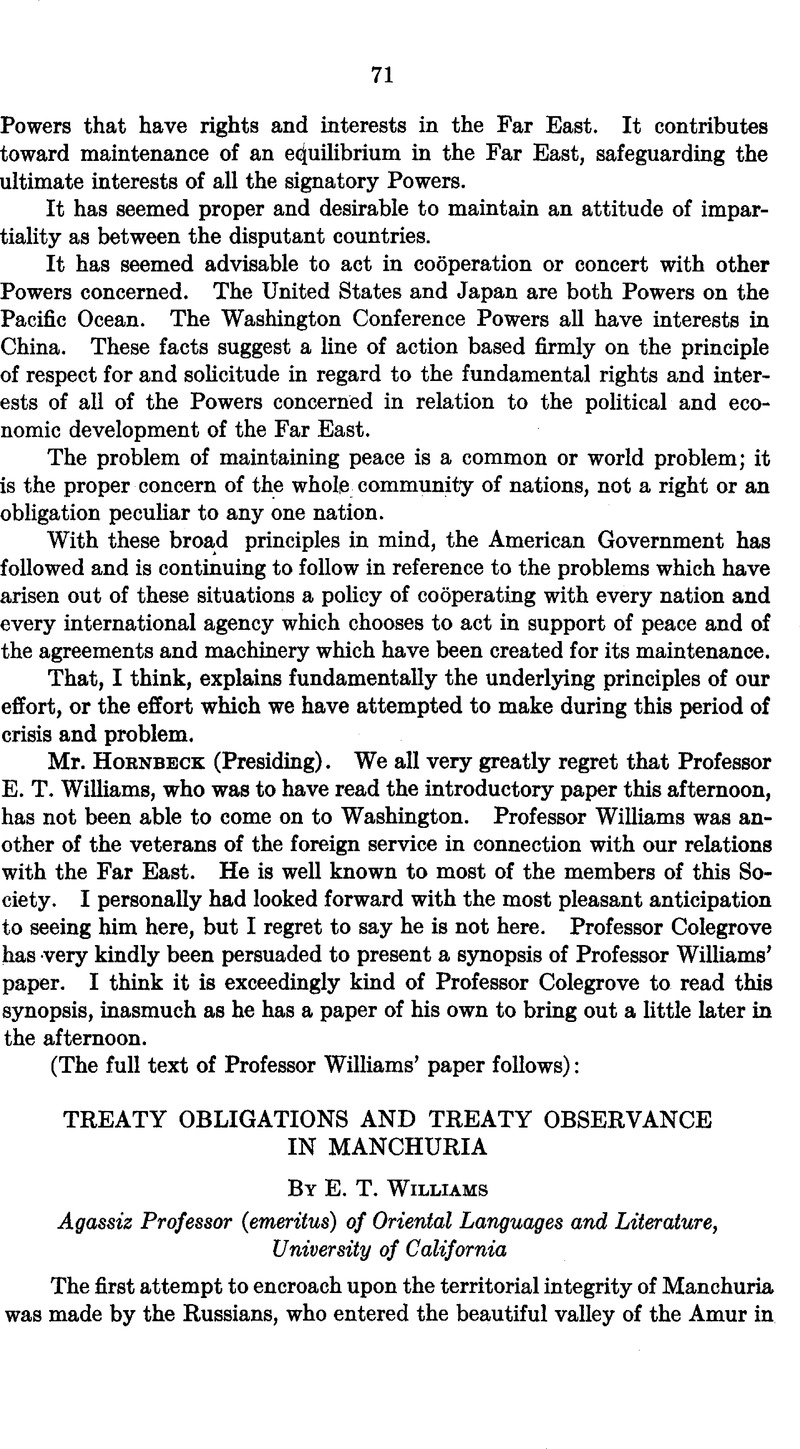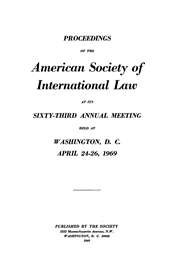Article contents
Treaty Obligations and Treaty Observance in Manchuria
Published online by Cambridge University Press: 27 February 2017
Abstract

- Type
- Third Session
- Information
- Copyright
- Copyright © American Society of International Law 1932
References
1 Although there were rumors of the existence of such a treaty, no official publication of its text was made until it was communicated by the Chinese delegation to the Washington Conference in 1922.
2 Foreign Relations of the U. S. 1901, Appendix, p. 19.
3 Ibid.,1902,p.929.
4 The U. S. Foreign Relations, 1901, Appendix, p. 19.
5 Morse, International Relations of the Chinese Empire, III, p. 306, n.
6 It may possibly be of some interest to mention a personal experience. On the day which was to bring Li’s life to an end the American Minister sent me to the Viceroy’s home to consult with him about a matter pending between the United States and China. In the reception room a secretary told me that Li was very ill and could not see me. Some days later the Military Governor of Peking told me that the aged Viceroy’s death had been caused by a paroxysm of rage induced by his discovery that a subordinate had been bribed to alter a memorial to the Throne in which the name of a man, whom Li had recommended for Manager of the Peking-Mukden Railway, had been replaced by that of the briber. The Imperial Edict had been issued appointing the briber to the post and, since Li could not confess that he had not read over the text of the memorial, he was helpless. He had been a paralytic for some years; this attack of anger brought on another stroke that ended his life. It would be interesting, although futile, to speculate upon the probable course of events if the Viceroy had lived to sign the agreement. It is not likely that Japan could have been kept from war, and, even had China’s ports been thrown open to Russia, the outcome of the conflict would probably have been just what occurred.
7 U. S. For. Rel. 1902, p. 929.
8 MacMurray’s Treaties and Agreements with and Concerning China, Vol. I, p. 327.
9 See official Report of the Conference, 8th, 9th, 11th and 13th Meetings of the Committee on Pacific and Far Eastern Questions.
10 Wanpaoshan Incident, edited by Whitewall Wang, published by the International Relations Committee of the Chinese National Government.
11 MacMurray’s Treaties, Vol. II, p. 1220.
12 MaeMurray’s Treaties, Vol. I, p. 76.
13 Ibid., Vol. I, p. 86.
14 Ibid., p. 551.
15 The Sino-Russian Crisis, by International Relations Committee of the Chinese National Government.
16 Official Report of the Conference, p. 182.
17 MacMurray’s Treaties, Vol. I, p. 658.
18 For correspondence, see Newchwang, June 30, 1914, to Dept. of State; Tokyo, July 4, 1914, to Dept. of State; Newchwang, July 6, 1914, to Dept. of State; Tokyo, Oct. 8, 1914, to Dept. of State; Dairen, Oct. 9, 1914, to Dept. of State; Newchwang, Oct. 17, 1914, to Dept. of State.
19 Article VII. See MacMurray’s Treaties, Vol. I, p. 523.
20 The Manchuria now placed under the government of Pu-yi, formerly the Emperor of China, consists of four provinces; Heilungkiang, Kirin, Shengking (now called Liaoning), and Jehol. Its total area is 448, 957 sq. mi. Manchuria, therefore, is larger than the six states of New England added to New York, New Jersey, Pennsylvania, Maryland, Delaware, District of Columbia, Virginia, West Virginia, Ohio, Michigan, Indiana and Illinois, i.e., larger than eighteen of our states. It has a fertile soil and bracing climate. It is watered by five great rivers and is rich in mineral resources. Placed on our Atlantic seaboard in the same latitudes, it would extend from Norfolk, Va., to the northernmost point of Newfoundland. Its longest axis east and west would reach from! New York to St. Paul.
21 Sino-Japanese Negotiations of 1915,Carnegie Endowment for International Peace, Pamphlet No. 45, p. 68.
22 In the University of California Chronicle, January, 1932, “Japan’s Interest in Manchuria.”
23 History of Treaty of Versailles, Minutes of Meeting of Council of Three on April 29, 1919.
24 Memorandum, Secretary of State to Japanese Ambassador, Aug. 27, 1919.
25 Text of Covenant of League of Nations.
26 Official Report of Washington Conference, text of Nine-Power Treaty.
- 1
- Cited by


